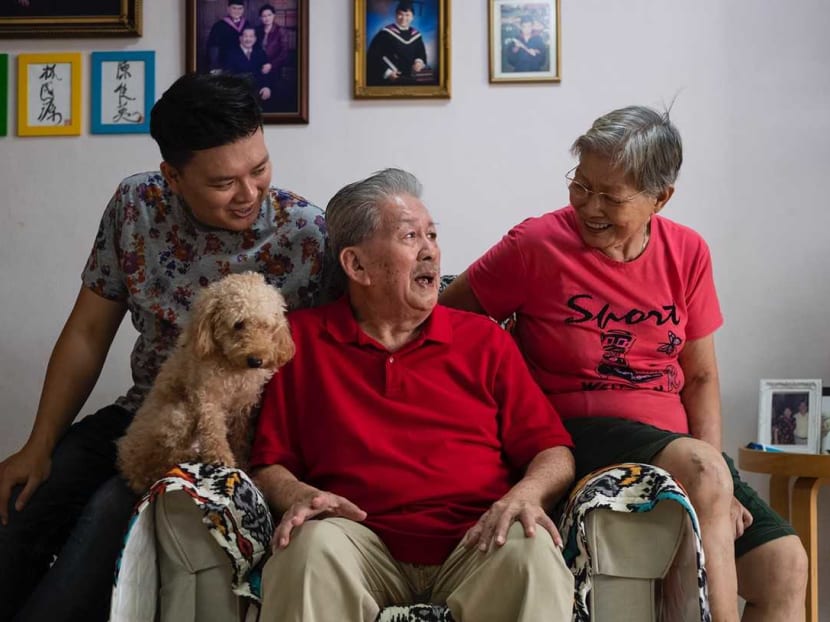Down but not out: People living with dementia rise to become ambassadors for illness
SINGAPORE — Mr Peter Lim Sun Hoe was a salesman before he was diagnosed with dementia 10 years ago. Now, thanks to a new initiative, the 81-year-old has a newfound purpose — helping to tear down stigma surrounding the illness.

Mr Peter Lim Sun Hoe, his wife Madam Tan Quee Eng and son Mr Daniel Lim are looking forward to Mr Lim's role as an ambassador to help remove some of the stigma associated with dementia.
SINGAPORE — Mr Peter Lim Sun Hoe was a salesman before he was diagnosed with dementia 10 years ago. Now, thanks to a new initiative, the 81-year-old has a newfound purpose — helping to tear down stigma surrounding the illness.
“I am living with dementia, but I am okay and normal. I know what is going on around the world,” the chatty retiree said of his condition.
“Sometimes, I do things in a slower way, and I seem to remember things that happened many years ago, things from 50 years ago. Sometimes, I may forget things that happened yesterday. My brain works in such a difficult way, but this is okay. I will take it as it comes.”
Mr Lim’s engaging and enlightening insights into his own condition are being employed by the Alzheimer’s Disease Association (ADA) in a fresh approach to educating the public about a condition that affects tens of thousands of Singaporeans. Dementia sees brain cells die at a faster rate than normal, leading to failing memory, poorer intellectual function and personality changes.
The ADA is piloting a programme, called Voices for Hope, drawing on the talents of people such as Mr Lim, to educate the general public about the illness after a recent survey it conducted found that nearly three in four dementia patients here experience rejection and loneliness.
Since January, it has put 12 people with mild dementia such as Mr Lim through eight three-hour sessions on Saturdays to equip them and their caregivers with self-advocacy skills.
During the sessions, participants take turns to introduce themselves — a frequent occurrence since they might have forgotten one another over the course of the week. They also take part in scrapbooking and write letters to their loved ones.
These and other activities are designed to help build the confidence of participants in speaking about their own dementia condition.
The latest batch to do the course, including Mr Lim, completed it last Saturday (July 13).
Straight after that, the newly minted “self-advocates” are slated for a series of public engagements such as roadshows and talks, including one at Sengkang Community Hospital in September.
In a conversation with TODAY on July 3, Mr Lim showed every sign of being an ideal candidate for the role — well-equipped, whether on stage or on camera, to dish out thoughts on his condition, as well as anecdotes about life after dementia.
‘PEOPLE WITH DEMENTIA HAVE ABILITIES’
Why train these dementia patients? ADA spokesperson Jeremy Khoo said that the association had previously engaged “prominent” self-advocates — such as Ms Kate Swaffer and Mr Dennis Frost from Australia — to speak, but there is little reason why individuals here can’t become self-advocates in their own right.
He also said it is not right that people with dementia here are generally seen as incapable of making decisions, and their opinions are rarely sought.
This, Mr Khoo added, would only “exacerbate the stigma towards dementia”.
“Nothing is more impactful and inspiring than to hear from persons living with dementia. It allows society to realise that we can still tap their remaining abilities even though they have dementia,” he said.
The stigma, if left unaddressed, will only grow as the Singapore population continues to age.
An Institute of Mental Health study in 2015 projected that one in 10 people aged 60 and above have dementia. This translates to almost 82,000 in 2018, with the number expected to exceed 100,000 in a few years’ time, ADA noted.
The survey that the association conducted earlier this year in conjunction with the Singapore Management University found that more than half of dementia patients felt that others treat them as less competent.
It also found that more than half the general population think that their knowledge of dementia is low, and more than two in five feel frustrated not knowing how to help people with dementia.
BIGGER SOLUTIONS FOR THE GROWING PROBLEM
ADA said that it has plans to build an alumni scheme around Voices For Hope, so the "graduates" may “sustain the journey of self-advocacy” as a community.
For continuity, it also said that participants will be invited to join the Forget Us Not Network supported by philanthropic house Lien Foundation, and this would continue to provide them with support, training and more speaking opportunities.
Mr Lim’s son, Daniel, dreams of the day people with mild dementia can be reintegrated back into the workforce — an area many corporates still “don’t know how to deal with”, he said.
Self-advocates could help new caregivers learn how to deal with their loved ones as well, the 39-year-old said. Mr Daniel Lim is the man behind the Enabling Festival, another effort aiming to raise dementia awareness by involving the performing and visual arts.
“Many caregivers don’t understand. (They) feel like they are losing their dad, losing their mum, cannot come to terms with it, and park them in a home,” he said.
“They've to recognise that their loved ones still have character, an identity, and a personality. It is just that now, there is a lens called dementia clouding that. Most of them can still brush their own teeth, make their own bread, and take their own medication despite needing multiple reminders.”











